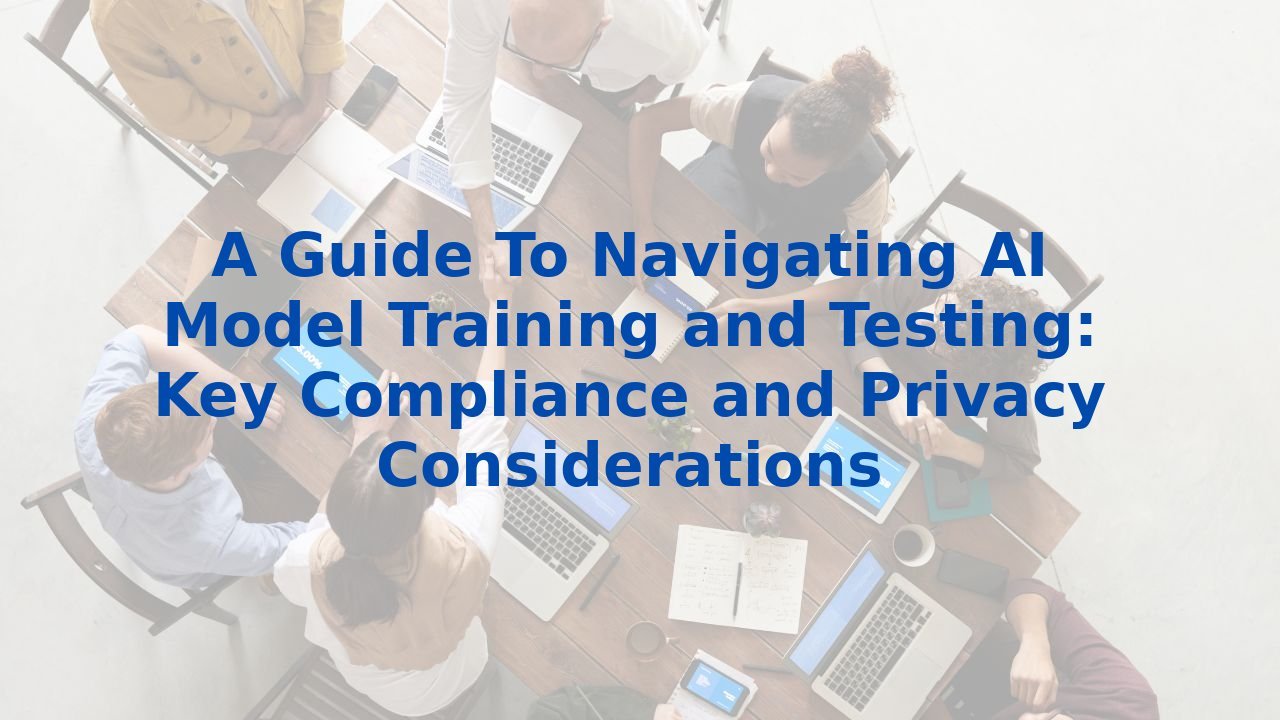A Guide To Navigating AI Model Training and Testing: Key Compliance and Privacy Considerations
A Guide To Navigating AI Model Training and Testing: Key Compliance and Privacy Considerations
Introduction
As the landscape of artificial intelligence (AI) continues to evolve at lightning speed, understanding the nuances of AI model training and testing becomes indispensable for organizations eager to tap into the full potential of AI. It’s not just about the algorithms; the compliance and privacy implications throughout these stages carry significant weight. This post aims to guide you through the pivotal considerations and underline how AI can drive efficiency at every turn within your organization.
Training vs. Testing
To grasp the importance of AI model training and testing, it helps to delineate their functions clearly:
Training:
Training refers to the process of refining AI models via well-curated datasets. Here, a substantial amount of data is fed to the model, enabling it to learn patterns, optimize performance, and evolve its capabilities over time.
Testing:
Testing, conversely, measures the performance of your model. This stage evaluates how accurately and reliably the model can predict outcomes across various conditions, ensuring it meets the necessary standards for production.
Key Compliance and Privacy Considerations
Navigating the compliance and privacy landscape is just as crucial as handling the technicalities. Here are some key considerations to keep top of mind:
- Training Data Legality:
Ensure the data utilized for training is ethically acquired. Verification of data sources is essential, ensuring that no privacy laws or regulations are breached. - Data Protection:
Guard the integrity of your testing data against unauthorized access. Establish robust data security measures to fend off potential breaches. - Confidentiality:
Securing your AI models and their training datasets from malicious actors is paramount. This can be achieved through encryption methods aimed at preventing unauthorized access. - Data Poisoning Prevention:
Implement instant safeguards against data corruption, as data poisoning can not only impair model accuracy but may also open doors to legal challenges.
Why Compliance Matters
Effective model training coupled with thorough testing transcends mere performance metrics; it encompasses the protection of user privacy and aligning with regulatory standards. Mastering these elements is indispensable for seamless production deployment and sidestepping costly penalties.
Enhancing Efficiency with AI
Artificial intelligence possesses the capacity to vastly enhance organizational efficiency on multiple fronts. Here’s how:
- Predictive Analytics:
AI has the power to analyze extensive datasets to forecast future trends, empowering organizations to make well-informed decisions. - Automation:
Routine tasks such as data entry and customer service can be automated, allowing human talent to pivot towards more strategic, high-value work. - Risk Management:
AI technology identifies potential risks pre-emptively, suggesting effective mitigation strategies and ultimately refining the risk management process. - Compliance Monitoring:
Leveraging AI-driven compliance tools can facilitate constant monitoring, ensuring that your organization adheres to regulatory mandates and mitigates breaches.
The Importance of Training Employees for AI
While the technology behind AI is formidable, its potential is fully realized only when employees are empowered to work alongside it competently. Here are notable benefits of training your workforce:
- Understanding AI Capabilities:
Educating employees about the strengths and limitations of AI fosters its effective integration into their daily activities. - Data Handling Expertise:
Training on data management safeguards compliance with privacy laws, ensuring proper handling and protection. - Model Interpretability:
Teaching employees how to interpret AI model outputs promotes trust and understanding of AI-driven decisions. - Ethical Responsibility:
Employees who are well-versed in AI ethics will be better equipped to deploy AI technologies responsibly and thoughtfully.
Conclusion
Successfully navigating the intricate world of AI model training and testing demands a comprehensive understanding of compliance and privacy factors. By focusing on these essentials, organizations can pave the way for smooth production deployment and avert costly repercussions. Moreover, integrating AI to enhance operational efficiency hinges on the proper training of employees. When organizations invest in education, they not only harness the immense benefits of AI but also uphold ethical and legal standards, laying the groundwork for sustained success.



